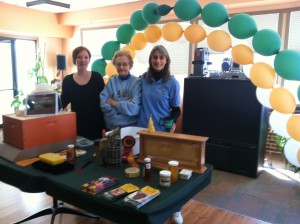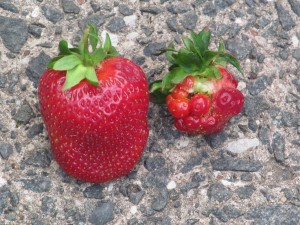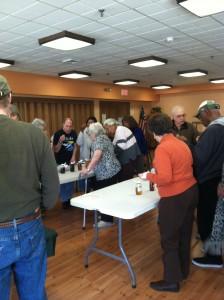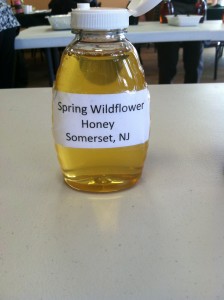
Allyson Toth, Manager of the Quail Brook Senior Center in Somerset, NJ with Cathy (right) and her Mom, Gloria, at the “Beekeeping Essentials” program that was offered as part of Somerset County’s National Agriculture Day festivities. Tara Kenyon photo.
Wolgast Tree Farm and Apiary was proud to be part of the celebrations around Somerset County in observance of National Agriculture Day. March 18th was the specific day devoted to recognizing and celebrating the abundance provided by American agriculture, but the Somerset County Agricultural Development Board and the Somerset County Cultural and Heritage Commission organized events throughout the month of March. These events promoted the importance of agriculture in Somerset County to the local economy, healthy living through locally grown foods, and the benefits to the community through agritourism and land preservation. Cathy, with lots of help from her mother, Gloria, contributed by offering a program on beekeeping at the Quail Brook Senior Center in Somerset, NJ on March 23rd.
Beekeeping plays a huge role in the success of American agriculture. Honey bees are known as “the engines that drive agriculture” because of the pollination services they perform.

The strawberry on the left has been properly pollinated, while the one on the right has not. Which one would you rather eat?
Even if farmers have land with fertile soil and the right amount of rainfall, when there isn’t sufficient pollination (the transfer of pollen from one flower to another so that plant reproduction can occur), those flowers won’t properly develop into the fruits and vegetables that we eat, if they develop at all.
But it is honey that comes to most people’s minds when they think of honey bees. Honey bees are the only insect to directly produce food that is eaten by people, and honey is itself an important agricultural product. Over 300 varieties of honey are produced in the United States. Many are a result of the pollination work done for agricultural crops, such as orange blossom and blueberry honey.

Seniors tasting the different varieties of honey that Cathy brought to the Quail Brook Senior Center as part of the beekeeping presentation in observance of National Agriculture Day. Tara Kenyon photo.
Cathy offered a honey tasting so folks could experience for themselves how the nectar sources that honey bees visit dictate what honey will look, smell and taste like. She didn’t have 300 types of honey for people to try, but the five that she did have were enough for folks to understand how different – and delicious! – they each were. People were offered tastes of orange blossom, clover, blueberry, buckwheat and a spring wildflower honey that was produced by Cathy’s bees only a few miles away from the Senior Center.

Local honey at its best! A jar of spring wildflower honey produced by the honeybees at Wolgast Tree Farm & Apiary right in Somerset. Tara Kenyon photo.
Cathy had a variety of beekeeping items for people to examine, too. She brought along a small beehive (minus the bees!), some tools that are commonly used in beekeeping like a smoker and veil, different forms of honey (comb honey, creamed honey, a frame of honey), and different types of beeswax products (like beeswax candles). She also put out a variety of educational brochures for people to take with them that had information about how to tell the difference between honey bees and other stinging insects, how to react to honey bee swarms and some recipes using honey.
Cathy and her Mom, Gloria really enjoyed meeting the people at the Quail Brook Senior Center in Somerset and having an opportunity to talk about honey bees and the role they play in agriculture. Folks had really great questions and many said that they would now think about honey bees when they visited the produce section of the grocery store or their local farmer’s market. The Manager at the Quail Brook Senior Center, Allyson Toth, said folks talked about the beekeeping program the whole week. All in all a great way to celebrate National Agriculture Day!